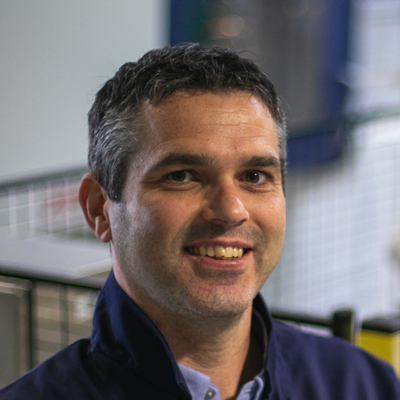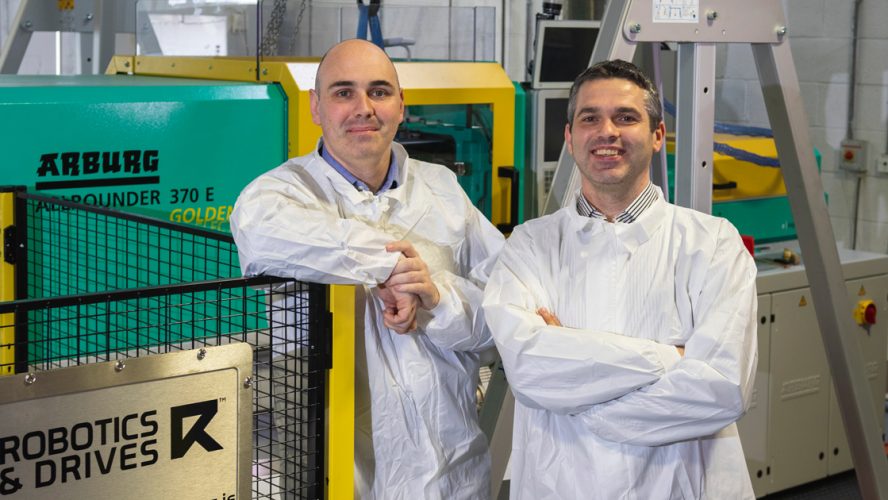
Dr Declan Devine
Director, the Materials Research Institute
Picture above: Dr Sean Lyons, Dean of Faculty of Engineering and Informatics and Dr Declan Devine, Director of the Materials Research Institute, both of Athlone Institute of Technology and CONFIRM SFI-funded investigators.
Ireland is on the precipice of a fourth industrial revolution driven by advances in smart manufacturing – a convergence of the digital and physical world which enables machines to ‘talk’ to one another through the internet.
At the epicentre of this seismic technological shift is Athlone Institute of Technology’s brand new smart manufacturing cell, which aims to take ‘people out of the process’, instead using robots, intelligent sensors and complex algorithms to improve the accuracy, reliability and speed of production lines.
The smart manufacturing cell, which is funded by CONFIRM, a €47 million SFI-funded smart manufacturing research centre aimed at improving Irish manufacturing competitiveness through technological advancement, is currently Ireland’s only polymer-based test bed open to industry.
CONFIRM’s six funded investigators – Dr Declan Devine, Dr Niall Murray, Dr Brian Lee, Dr Sean Lyons, Dr Enda Fallon and Dr Yuansong Qiao – all of Athlone Institute of Technology – are using the cell to educate and familiarise industry with new smart manufacturing technologies and the benefits of their subsequent adoption.
Smart manufacturing still seems very abstract – we need to educate industry
“While there’s a lot of talk about smart manufacturing and industry 4.0, from a practical industry perspective, people’s perceptions of it are still very vague. It feels intangible,” Dr Declan Devine, who is the director of Materials Research Institute, explained.
“For Ireland to move forward as a centre of smart manufacturing, it’s crucial that industry gets behind it. We’re trying to facilitate this by upskilling people in emerging technologies and giving industry a testing-ground to try out these new smart manufacturing capabilities.”
Robotics and AI mean that we can compete with low-cost labour
Athlone Institute of Technology has long been at the forefront of polymer research and innovation, producing generations of highly skilled polymer engineers who now form the backbone of Ireland’s thriving medical technology sector – a sector which is heavily reliant on polymer technology.
Seen as an early adapter of responsive, connected manufacturing, Ireland is ideally situated for a smart manufacturing revolution thanks to its strong manufacturing and ICT base. A microcosm of this, Athlone Institute of Technology houses two Enterprise Ireland-funded gateways on its campus: COMAND, which specialises in ICT engineering, and APT, which specialises in polymer processing.
“Polymer is of vital importance to the Irish economy with over 200 companies in the sector. The majority of medical devices require at least one polymer component making it a core technology in the MedTech sector, which itself is 400 companies strong and employs over 12,000 people nationally,” Dr Devine said.
In the Western world, where the cost of labour is high, the only way for companies to compete with countries with low-cost labour is through highly sophisticated, automated processes i.e. smart manufacturing.
It’s not a question of if we act, we have to act
“If Ireland wants to remain competitive, we have to act now before we get squeezed by low cost and high tech economies already embracing smart manufacturing. It’s not a question of if we act, we have to act or else we’ll haemorrhage jobs. People might fear automation, but the reality is smart manufacturing will have an incredibly positive impact on the midlands and the Irish economy.
“Current research indicates that for every robot brought into a company, three highly-skilled jobs are created. None of these jobs are going to be minimum wage – they’ll be highly skilled, well-paid polymer, automation and software engineering jobs,” Dr Devine added.
As a primary member of the CONFIRM consortium, being selected to establish this new smart manufacturing cell and subsequent pilot line speaks volumes about Athlone Institute of Technology’s reputation as an innovation partner of choice for industry – demonstrable by the sheer volume of Enterprise Ireland Innovation Vouchers it completes every year.
“We’re known as the ‘polymer people’ across Ireland and Europe for good reason. Our smart manufacturing cell is a national resource for industry to utilise. We want companies big and small to know that we are open for business. We have the funding, we have the people and we have the expertise,” he finished.
Athlone Institute of Technology is a member of five SFI Research Centres – CONFIRM, AMBER, CÚRAM, ADAPT and SSPC – and is currently in the midst of achieving technological university status in partnership with Limerick Institute of Technology.


